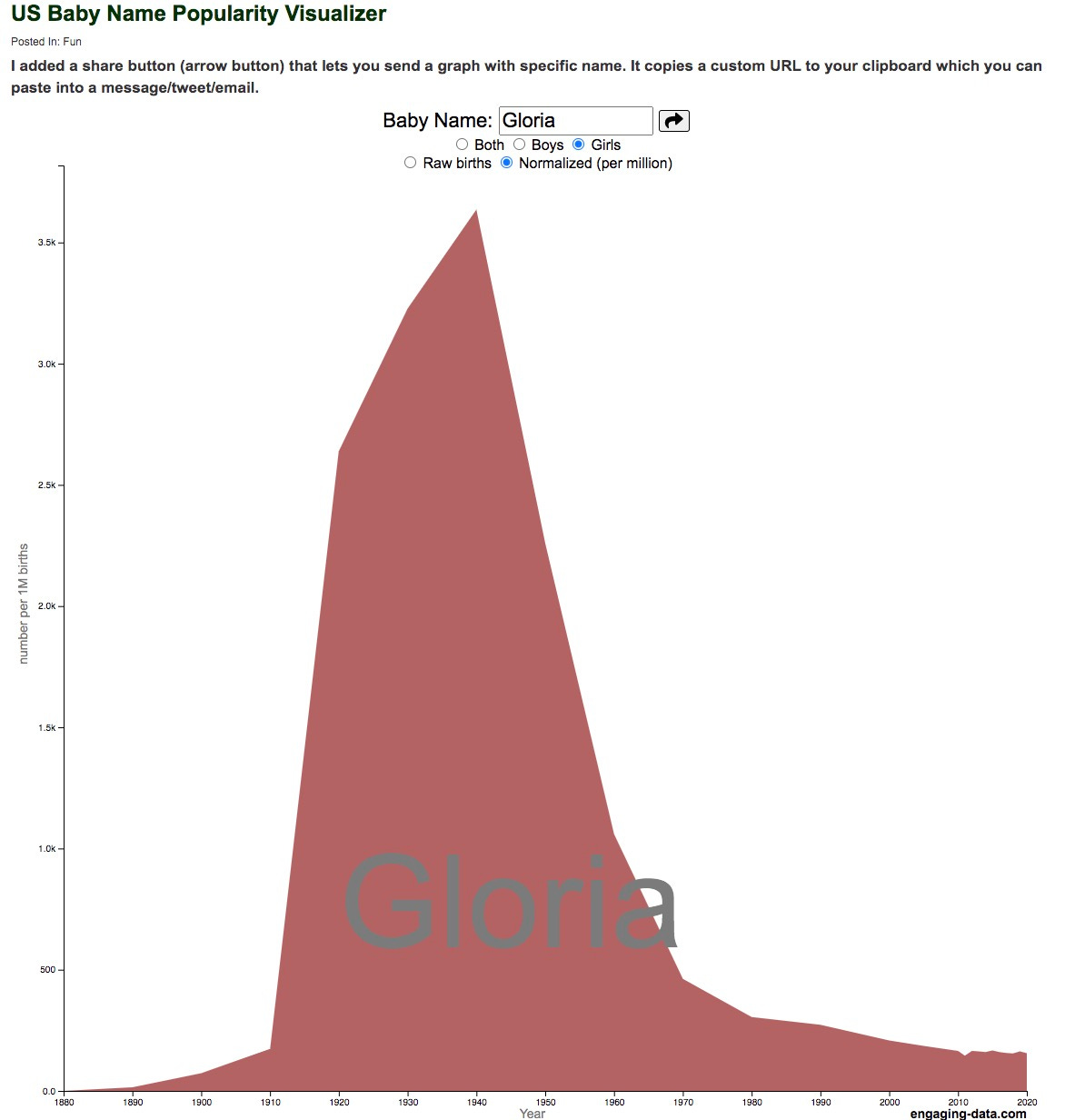'Gloria' tops the chart of names most ruined by pop music
& the intermittent fasting diet: Does it work?
8-4-2022 (issue No. 47)
Eric Zorn is a former opinion columnist for the Chicago Tribune. Find a longer bio and contact information here. This issue exceeds in size the maximum length for a standard email. To read the entire issue in your browser, click on the headline link above.
This week:
Last week’s winning tweet — it may be the best one of the year!
The name Gloria is in the news — and it’s not so glorious if your friends are into pop music
Intermittent fasting — a fad diet or a new way of life?
News and Views — on abortion and unrest under Kim Foxx
The Land of Linkin’ — in which I tell readers where to go
Thank you, John Kass for inspiring some important critical writing this week
Re:Tweets — this week’s nominees
Tune of the Week — "They Don't Let You in the Opera if You’re a Country Star,” a stunning mashup that vies for the title of funniest song ever
The baseball season in Chicago has become such a dull, mediocre slog that I am discontinuing the “Race to the slop” feature until further notice. Mary Schmich’s entries will return eventually!
Last week’s winning tweet

This is one of the all-time great tweets, in my view. I look for it to do very well when we do the Tweet Madness bracket tournament next March.
Scroll down to read this week’s nominees or just click here to vote in the new poll.
Sorry, Roxanne, but Gloria tops the list of names most ruined by pop music
The death Friday of Jimy Sohns, 75, of suburban Roselle sent me to YouTube to listen again to “Gloria,” the mid-1960s hit song as performed by Sohns’ garage-rock band, The Shadows of Knight:
“Gloria,” originally written and recorded by Van Morrison, was a top 10 Billboard hit for the Shadows of Knight in 1966. And according to Sohns’ obituary in the Sun-Times, he “was still shouting out ‘G-L-O-R-I-A!’ at performances as recently as last month” but recently suffered the stroke that took his life.
Women and girls named Gloria endured years of having new acquaintances sing the signature line to them, and just as that annoyance was starting to fade, along came Laura Branigan in 1982 with a totally different song titled “Gloria” that reached No. 2 on the Billboard charts:
Branigan died in 2004 at age 52 of a brain aneurysm.
U2 also has a “Gloria,” as does the 1950s doo-wop group the Cadillacs.
Humorist Dave Barry once quipped about the original, 1960s version, "You can throw a guitar off a cliff, and as it bounces off rocks on the way down, it will, all by itself, play `Gloria.’" I’m not sure why that’s funny, exactly, but it certainly speaks to the ubiquity of the song even to this day.
This all got me woolgathering about other names that have become uncomfortably connected to pop music lyrics to the point that everyone so named is heartily and thoroughly sick of people alluding to it.
With the help of my Facebook family, I put together this list:
Alison, Amanda, Barbara Ann, Billy Jean, Brandy, Caroline, Cecilia, Delilah, Eileen, Georgia, Jolene, Jude, Layla, Lola, Maggie May, Mandy, Michelle, Maria, Mary Lou, Renee, Rhonda, Roxanne, Sally, Sharona and Sherry
The names on this list that are more inextricably linked to songs than Gloria — Barbara Ann, Billy Jean, Brandy, Cecilia, Jolene, Jude, Maggie May, Mandy, Mary Lou, Rhonda, Roxanne Sally, Sharona and Sherry — are fairly uncommon (though Jolene has made a comeback and is currently slightly more popular than Gloria, which has been slowly fading over the past 70 years).
The names on the list more common today than Gloria — Alison, Amanda, Caroline, Cecilia, Delilah, Eileen, Georgia, Layla, Lola, Michelle, Maria, Renee and Valerie — are arguably less associated in the common mind with the songs they evoke.
Therefore Gloria deserves the designation of name most ruined by pop music.
I will entertain arguments to the contrary in the comments salon.
Life in the fasting lane
I spent last weekend on a beach getaway in the company of, among others, a longtime friend now living in California who has battled obesity most of his life. And I noticed both that he was looking particularly trim and that he wasn’t allowing himself to eat until early in the afternoon.
He explained that he’d been following a regimen for well over two years in which he waits 16 hours after finishing dinner before he eats again. This accounted for the timing of our meals and, at least partially, for the dramatic change in his appearance.
I pay very little attention to news about popular diet plans. They all seem faddish and ultimately unsustainable; temporary acts of self-discipline that are flimsy crutches for those like me who can’t simply eat moderately and healthfully while getting a bit of exercise each day.
So I’m evidently one of the last people in America to learn about intermittent fasting — or “IF” as it’s called — a set of reform eating plans that first gained traction about 10 years ago.
The particular program my friend was following — eating only in an eight-hour window each day — is sometimes called “time-restricted feeding,” which sounds somewhat agricultural. It allows him to eat as he pleases during that window, no eliminating carbs, counting calories or foraging for raw foods.
Fasting has always struck me as the least effective and possibly most unpleasant method of weight reduction imaginable. But my friend says he got used to the program quickly, and the reading I’ve done since suggests that many doctors are at least OK with it.
Johns Hopkins neuroscientist Mark Mattson, has studied intermittent fasting for 25 years. … Mattson’s research shows that it can take two to four weeks before the body becomes accustomed to intermittent fasting. You might feel hungry or cranky while you’re getting used to the new routine. But, he observes, research subjects who make it through the adjustment period tend to stick with the plan, because they notice they feel better. … One of Mattson’s studies published in the New England Journal of Medicine revealed data about a range of health benefits associated with the practice. These include a longer life, a leaner body and a sharper mind.
“Many things happen during intermittent fasting that can protect organs against chronic diseases like type 2 diabetes, heart disease, age-related neurodegenerative disorders, even inflammatory bowel disease and many cancers,” he says.
The University of Illinois Chicago Department of Kinesiology and Nutrition:
These regimens may benefit cardiometabolic health by decreasing blood pressure, insulin resistance, and oxidative stress. Low-density lipoprotein cholesterol and triglyceride levels are also lowered, but findings are variable. Other health benefits, such as improved appetite regulation and favorable changes in the diversity of the gut microbiome, have also been demonstrated, but evidence for these effects is limited. Intermittent fasting is generally safe and does not result in energy level disturbances or increased disordered eating behaviors. In summary, intermittent fasting is a safe diet therapy that can produce clinically significant weight loss (>5%) and improve several markers of metabolic health in individuals with obesity.
Harvard School of Public Health:
Research does not consistently show that intermittent fasting is superior to continuous low calorie diets for weight loss efficiency … (but) a systematic review of 40 studies found that intermittent fasting was effective for weight loss. … Although certain benefits of caloric restriction have been demonstrated in animal studies, similar benefits of intermittent fasting in humans have not been observed. It is unclear that intermittent fasting is superior to other weight loss methods in regards to amount of weight loss, biological changes, compliance rates, and decreased appetite. Certain people who typically eat one or two meals a day or do not eat for long stretches of time may show better compliance with this type of regimen. Additionally, people who tend to eat or snack excessively at night may benefit from a cut-off eating time, especially if the late eating leads to unpleasant side effects such as reflux or disrupted sleep.
An academic study published by Obesity Reviews concludes no, practitioners of IF don’t tend to eat like Homer Simpson at Thanksgiving when their timers — sometimes in handy phone apps — go off:
Calorie restriction is associated with reduced food cravings supporting a de-conditioning model of craving reductions.
There are certainly caveats — IF is not recommended for those who are pregnant or breastfeeding, those who are under 18 and those who are living with diabetes or other blood-sugar problems. The Mayo Clinic lists as potential side effects: hunger (duh), fatigue, insomnia, nausea and headaches.
Additionally, I found these articles:
Despite the hype, intermittent fasting isn't a magic weight-loss cure (Washington Post)
A potential downside of intermittent fasting (is muscle loss) (New York Times)
Intermittent fasting for weight loss works — for men (Chicago Tribune)
Is intermittent fasting the diet for you? Here’s what the science says (The Conversation)
What Is Intermittent Fasting? Explained in Human Terms (Healthline)
The key to any such behavioral modification is whether it can truly last — not for a month or even a couple of years, but for a lifetime. The difficulty of turning a change into a true transformation has long intrigued and even frustrated me, so I’m very interested in progress reports from any of you who adopted this dietary habit five or more years ago. How is it going/did it go?
News & Views
News: Voters in deep-red Kansas delivered a stunning victory for abortion rights.
View: I’m far less sure now that the price of gas and groceries is going to be foremost on voters’ minds this fall. The very high turnout in Kansas that resulted in an 18-percentage-point defeat for a referendum proposal to remove abortion-rights protections from the state constitution indicates that voters are not having it with the anti-abortion extremism of the Republican Party — see, for example, “The Georgia Department of Revenue confirmed Monday that Georgians can claim embryos with cardiac activity as dependents on their taxes.”
Opinion polls have long shown that a solid majority of Americans are somewhere in the middle when it comes to abortion. Many approve of some limits on the procedure, but very few support the “under no circumstances” prohibitions being advanced by zealous legislatures across the country.
Such stories as “They Had Miscarriages, and New Abortion Laws Obstructed Treatment” and “Because of Texas abortion law, her wanted pregnancy became a medical nightmare” along with “Michigan GOP candidate: 14-year-old incest victim is ‘perfect’ evidence for abortion ban” and “West Virginia State Rep. Pritt (R) attempts to argue that making absent fathers pay child support will encourage more abortions,” and other examples of mercilessness are opening eyes to the scope of the agenda of those who call themselves pro-life.
Abortion-rights advocate Terry Cosgrove, President and CEO of PersonalPAC, pointed out during an appearance in our Northwest Side neighborhood Wednesday evening that given the understandable skittishness of doctors in states with stringent abortion restrictions to provide care during miscarriages, even those who are pregnant and glad of it should be very wary to drive through such states, much less relocate to them.
News: Illinois Republican gubernatorial candidate Darren Bailey’s comparison of legal abortion in the United States to the Holocaust draws fire from Jewish groups and his political opponents.
View: Bailey’s statement should not surprise us. His comment in a recently discovered 2017 video — “The attempted extermination of the Jews in World War II doesn’t even compare on a shadow of the life that has been lost with abortion” — is perfectly consistent with the absolutist position that abortion is murder. Thus, numerically speaking, Bailey was simply highlighting that position.
True, comparing the hateful, brutal attempt to exterminate the Jewish people by systematically killing adults and children with the difficult decisions made by tens of millions of women to their terminate pregnancies, usually early on, feels grotesque and obtuse to most of us. I don’t find Bailey’s statement “antisemitic” as Gov, J.B. Pritzker’s campaign spokeswoman claimed, because what animated it was not trivialization of the value of Jewish life but a telltale amplification of the value of embryonic life, one that has major and troubling implications (see above).
News: Staff defections are rattling the office of Cook County State’s Attorney Kim Foxx
View: A series of recent stories suggests that attrition and sinking morale under progressive top prosecutor Kim Foxx are far worse than routine turnover or a predictable artifact of the pandemic:
The farewell letter to colleagues last week from one of Foxx’s top deputies, James Murphy, was brutal:
This administration routinely claims that they have shifted their focus from prosecuting low level crimes so that they can focus their resources on fighting violent crime and drivers of violence. This is simply not true. … If this administration was truly concerned with effectively fighting violent crime, then they would fully staff those courtrooms and units. Not create more useless policy positions on the executive staff at the expense of hiring more (assistant state’s attorneys) who can work in the trenches. … I can no longer work for this administration. I have zero confidence in their leadership. … This administration is more concerned with political narratives and agendas than with victims and prosecuting violent crime.
From a Tribune story that predated Murphy’s letter:
The Tribune interviewed several longtime prosecutors who wished to remain anonymous because they were not authorized to speak to the press. When asked about staffing problems, they used words like “hemorrhaging,” “unheard of” and “dumpster fire.”
In a letter to her team Monday, Foxx wrote “Significant staff turnover is not unique to our office — prosecutorial offices across the country, such as St. Louis, Baltimore, and New York City, are experiencing similar departures and overworked staff.”
It’s one thing when the public doubts that a state’s attorney is taking public safety and crime reduction seriously. It’s another when her staff shares those doubts, doubts that her letter does not address.
Gallant and Goofus
Land of Linkin’
Thursday marks the release of the 500th episode of my former colleague David Axelrod’s “Axe Files” interview podcast. His guest will be singer/actor John Legend. Last Thursday’s show was a rerun of the first episode, a Sept. 28, 2015, chat with Vermont Sen. Bernie Sanders. Axelrod, a high-profile Democratic campaign consultant who founded and directs the University of Chicago Institute of Politics, also co-hosts “Hacks on Tap,” an informative chumcast featuring political insiders. Thursday’s Tribune has a lengthy interview with Axelrod.
The graphic above on the name “Gloria” came from the U.S. Baby Name Popularity Visualizer, which has picked up where the now-defunct Baby Name Wizard left off. Babynames.com is also a good site for looking at the popularity of names over time.
In “Forget the Red Wave. Why ’22 Could Go Blue,” Jonathan Alter interviews Simon Rosenberg of the New Democrat Network on why he’s optimistic about the midterm elections this fall.
“Punctuality Is Trending, and It's About Time,” writes columnist Steve Chapman. “Excuses are harder to come by these days. … Chronic latecomers are finding themselves less likely to be accommodated. If they have to get used to living in a punctual world, I suggest they keep in mind Yogi Berra's observation: ‘It gets late early out here.’"
From “The Future of the Daily Newspaper; As newspapers cut print editions, lines blur between dailies and weeklies” by my former colleague Greg Burns: “The publisher of USA Today and 493 other newspapers has announced plans to transition many of its dailies to six-day print delivery. Most have chosen to cut Saturdays in print, while substituting e-editions to provide timely coverage of important local-news events such as Friday night sports. No one would be surprised if that schedule wound down over time to five days or fewer, with some markets shifting more rapidly than others. … The shift to fewer print days has been building, as circulation of dailies declined sharply over the past two decades. The decline has put a spotlight on a long-standing business problem for dailies: Even at their peak in the 1990s, most dailies were profitable only two or three days a week. Sunday was so profitable it allowed for distribution seven days a week.”
“How Did Maryland Republicans Nominate Two Extremist Screwballs for Statewide Office?” (The New Republic) State attorney general nominee Michael Peroutka’s pledge to “bring God back” to state government comes from “Christian Reconstruction, a far-right theology and political ideology that has left a profound imprint on the Christian right. Christian Reconstruction holds that God granted extremely limited authority to government, chiefly law enforcement, and that government officials have an obligation to impose ‘biblical law.’” What could go wrong?
“‘Let police be police’ has become a campaign refrain for some of Chicago Mayor Lori Lightfoot’s opponents. ‘Not on my watch,’ she says” is a thorough and enlightening look at the politics of crime and policing in Chicago by the Tribune’s Alice Yin and Gregory Pratt.
The sickening tragedy early Sunday morning in which a wrong-way driver on I-90 near Hampshire died while killing a family of six and a passenger riding with the family had me asking: Why don’t engineers just install one-way spikes on exit ramps to prevent confused drivers from entering expressways going the wrong direction? The Texas Department of Transportation has listed the reasons why this would not work. Wrong-way drivers kill an average of more than 400 people a year. Technology needs to step up its game.
The Picayune Sentinel on the air: On Thursdays at 4:30 p.m., WCPT-AM 820 host Joan Esposito and I chat about ideas raised in the new issue. The listen-live link is here.
The Picayune Sentinel preview: Tuesday at 11:30 a.m. I talk with WGN-AM 720 host John Williams about what’s making news and likely to be grist for the PS mill. The WGN listen-live link is here.
Thank you, John Kass!
The self-important, self-pitying whining of conservative pundit John Kass over the recent and rather routine item in a Tribune real estate column about his move from the Northwest Side of Chicago to St. John, Indiana, prompted two worthwhile online responses this week, the first from Sun-Times columnist Neil Steinberg:
In 2000, I moved to the suburbs. Since certain columnists were already manifesting their lifelong habit of presenting themselves as living on Evergreen with the ghost of Nelson Algren, warming their hands over scrap lumber fires in 55-gallon oil drums on Lower Wacker Drive, when in fact they were hiding in Western Springs, hoarding dried food against the collapse of civilization, I was very public about my move, even writing an article about it for North Shore Magazine , which ran a photo of me, my wife and kids sitting on the front steps of our 1905 Queen Anne farmhouse in Northbrook. Nothing to hide.
This caught the attention of (Tribune freelance reporter Robert) Goldsborough, who noted that while I shared the tableau of a neighbor stopping her car in the street before our house and leaping out, door flung open, to demand, "How much did you pay for that?" I did not actually share the purchase price with my readers.
"But Upper Bracket will share," Goldsborough chuckled. "Steinberg paid $370,000 in June (although the sale closed in October) for the house on a half acre, according to public records." …
My reaction to my private real estate deals ending up in the pages of the Tribune was very different from Kass's. I remember reading Goldsborough's report with surprise, raising an eyebrow, and thinking, "'Upper bracket?' I wish!" No collapsing to the ground and clawing at myself. …
The news, John, is good, and I'm happy to be the one to share it with you and the world. It isn't you being picked on, or victimized, or paid back for your daring ... umm ... whatever it is you do that has made you the cynosure of a Dick Tracy rogues gallery of villains. We are brothers here. I too have felt Bob Goldsborough's lash. Or his fleeting professional attention, anyway. The Trib's real estate Torquemada gave similar treatment to a newbie nudnik more than 20 years ago. So you aren't the victim of vast conspiratorial forces arrayed against you.
It’s a lovely companion piece to “In defense of John Kass,” a January 2021 effort that also shows off Steinberg’s ability to turn a phrase that rivals that of the late wordsmith Christopher Hitchens.
At his website this week Kass attacked “the Jacobins of The Tribune (Union) Guild that run the newsroom” and named criminal courts reporter Megan Crepeau and City Hall reporter Greg Pratt while insinuating that they, “let their biases shape their judgment in favor of progressive political actors.”
This prompted former Tribune audience editor Charlie Johnson to post “John Kass, George Soros, and the response I never published” in order to clarify an issue that, as he noted, “Kass has continued to regularly bring up … in columns on his website and tweets.”
Soros, is a political financier and booster of the “progressive prosecutor” movement. He is also the target of conspiracy theories, rooted in anti-Semitism, about his “puppet master” like control of governments and people. The Pittsburgh synagogue massacre was inspired by them. A bomb was found at Soros’ house.
One does not need to be anti-Semitic — and I do not believe John is, to be clear — to be spun by these tropes. And just because one does not mention Soros’ religious background does not absolve one of responsibility for parroting them. Anyone with a brain knows out-and-out pronouncements of Jews controlling media or government will be revolting to most and find no home in any mainstream press. … To write about Soros and his money, therefore, requires care. It requires differentiating his influence as a financier of causes from crackpot theories about him creating migrant caravans headed for the border. … Writers who understand this would be careful to ward off the bigoted and mentally unstable with caveats and context.
If you’re still interested, I posted a broader look at Kass’ complaints about the union and his treatment at the paper last March in “Setting the record straight on John Kass, George Soros and the Chicago Tribune Guild.”
Minced Words
Freelance journalist Mark Guarino, Austin Berg and I joined host John Williams for this week’s episode of “The Mincing Rascals.” We discussed abortion and elections, Lollapalooza and NASCAR, the petition drive in Arlington Heights to prohibit the village from "offering or extending any financial incentive to any business or corporation to operate in the village." Read up on Pericles if you want to fully grasp Austin’s point about Chicago, and stick around to the end to hear me misuse the word “brackish.” Subscribe to us wherever you get your podcasts. Or bookmark this page. If you’re not a podcast listener, you can now hear an edited version of the show at 8 p.m. most Saturday evenings on WGN-AM 720.
Re: Tweets
In Tuesday’s paid-subscriber editions I present my favorite tweets that rely on visual humor and so can’t be included in the classic Tweet of the Week contest where the template for the poll does not allow the use of images. Subscribers vote for their favorite and I post the winner here every Thursday:
The new nominees for Tweet of the Week:
Kinda hope we need mandatory monkeypox shots just so I can say, in my best Inspector Clouseau voice, “Do you have a lay-sance for your minkey pucks?” — @PoodleSnarf
If someone asks you a question you don’t want to answer just say, “I don’t know. I ran into a sliding glass door and knocked myself out, and now I’m having trouble remembering things.” That will get them off your back for a week. — @MomOnFire
I text "just met my future husband!" to at least one friend after each first date, just to ensure someone has a cute anecdote to tell at our wedding. — @ginnyhogan_
Date: This was so fun, we should definitely do dinner again. Me: No thanks, I’m full. — @clichedout
The only good thing about getting older is the ever-increasing odds that an unforeseen medical incident will get you out of a social event. — @badbanana
My daughter gave me a tiny leaf as a present three days ago and now she wants to know where it is. Pray for me. — @Lottie_Poppie
I feel like Jesus dying for my sins was a pretty big overreaction. They aren’t that bad. — @christapeterso
So anyway, it turns out failure is an option. — @AllanForsyth
I love when I give my dog a bone and then he follows me around the house proudly showing it to me. It’s like, dude, I know, I gave it to you. — @StruggleDisplay
When life hands you lemons, teach a man to fish. That way, if he catches one, you'll have a lovely citrus garnish. — @GianDoh
Vote here in the poll. For instructions and guidelines regarding the poll, click here.
Tune of the Week
My nomination last week of “Pal-yat-chee” as the funniest song ever prompted some of you to nominate other amusing songs, including “The Most Beautiful Girl (In The Room)” (Flight of the Conchords); “You Won't Succeed On Broadway” (Spamalot); “Sex Farm” (Spinal Tap); “Step Right Up” (Tom Waits); and “Life in the Slaw Lane" by Kip Addotta.
But apropos of the mashup of opera and country, reader Mike Muhr submitted the stunning and hilarious "They Don't Let You in the Opera if You’re a Country Star,” a song written by Dan Lipton and David Rossmer to show off the talents of singer/actress Kelli O’Hara.
“It is a fiercely demanding showpiece that illustrates the proximity of country music to opera,” wrote New York Times critic Stephen Holden. “It is also a surefire crowd pleaser.”
The Tony award-winning O’Hara, 46, plays Aurora Fane in the HBO series “The Gilded Age.”
Consult the complete Tune of the Week archive!
The Picayune Sentinel is a reader-supported publication. Simply subscribe to receive new posts each Thursday. To support my work, receive bonus issues on Tuesdays and join the zesty commenting community, become a paid subscriber. Thanks for reading!














Thank you for "They Don't Let You in the Opera if You’re a Country Star”
The more we integrate smart technology into cars, the more opportunities we will have to make driving even safer. Technology could be designed to not allow cars to enter a highway or road the wrong way.